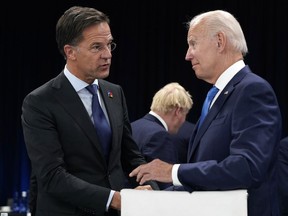
U.S., Dutch and Japanese officials are close to an agreement to limit China’s access to technology used to make computer chips, a Dutch semiconductor supply company confirmed Sunday.
ASML, a leading maker of semiconductor production equipment based in Veldhoven, Netherlands, said it was possible an agreement had already been reached but that it didn’t know any details about the deal or how it would affect ASML’s business.
Sign up to receive the daily top stories from the National Post, a division of Postmedia Network Inc.
Thanks for signing up!
A welcome email is on its way. If you don't see it, please check your junk folder.
The next issue of NP Posted will soon be in your inbox.
ASML is the world’s only producer of machines that use extreme ultraviolet lithography to make advanced semiconductor chips. The Dutch government has prohibited ASML from exporting that equipment to China since 2019, but the company had still been shipping lower-quality lithography systems to China.
The Biden administration in October imposed export controls to limit China’s ability to access advanced chips, which it says can be used to make weapons, commit human rights abuses and improve the speed and accuracy of its military logistics. It has urged allies like Japan and the Netherlands to follow suit.
China has responded angrily, saying trade curbs will disrupt supply chains and the global economic recovery.
“We hope the relevant countries will do the right thing and work together to uphold the multilateral trade regime and safeguard the stability of the global industrial and supply chains,” China’s Foreign Ministry spokesperson Wang Wenbin said this month. “This will also serve to protect their own long-term interests.”
ASML has research and manufacturing centers in Beijing and Shenzhen, China, as well as a regional headquarters in Hong Kong.
White House National Security Council spokesman John Kirby said Friday that Dutch and Japanese officials were in Washington for talks led by President Joe Biden’s national security adviser, Jake Sullivan, that covered the “safety and security of emerging technologies,” efforts to aid Ukraine and other issues.
“We’re grateful that they were able to come to D.C. and to have these talks,” Kirby said.
Kirby declined to say whether the U.S. was nearing a deal on tightening export controls on semiconductor technology. Biden earlier this month met separately with Japanese Prime Minister Fumio Kishida and Dutch Prime Minister Mark Rutte to push for tighter export controls.
In a press conference last week, Rutte was asked about the talks but said they involve “such sensitive material ⦠high-quality technology that the Dutch government chooses to communicate about it very carefully and that means in a very limited way.”
U.S. officials say China is spending heavily to develop its fledgling semiconductor producers but so far cannot make the high-end chips used in the most advanced smartphones and other devices.
——
AP reporters Aamer Madhani in Washington and Mike Corder in The Hague, Netherlands, contributed to this report.


